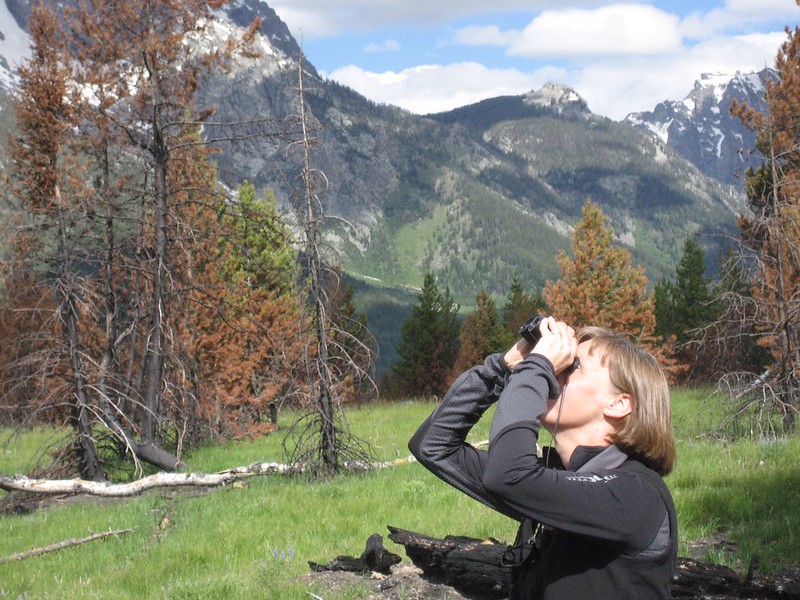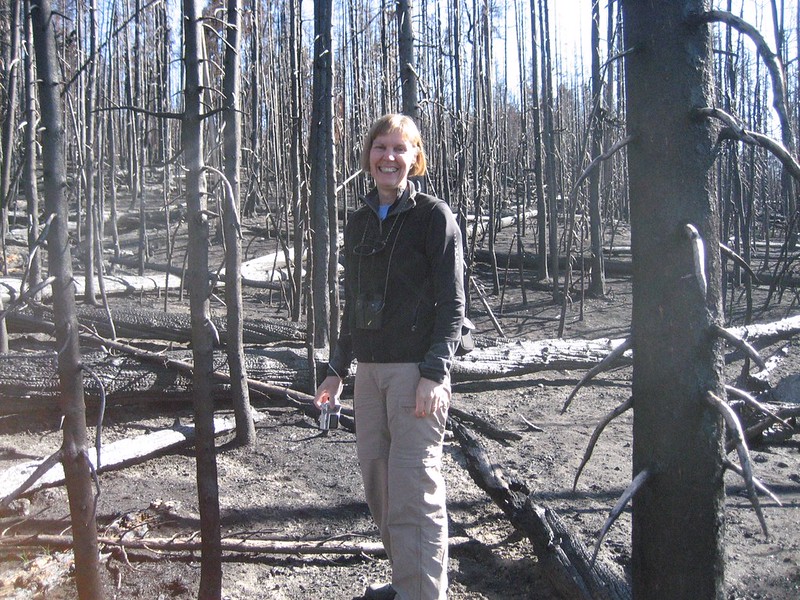Landscape ecologist Monica Turner steps up as ESA’s 2015-16 President
Monica Turner, the Eugene P. Odum Professor of Ecology and a Vilas Research Professor in the Department of Zoology, University of Wisconsin-Madison became President of the Ecological Society of America (ESA) on August 14, 2015. She will serve for one year.

Landscape ecologist Monica Turner travels in her team’s boat, PICO1, across Yellowstone Lake in Yellowstone National Park in July 2012 to access long-term study plots in areas that burned during the 1988 Yellowstone Fires. Named for Pinus contorta, the lodgepole pines that dominate Yellowstone’s forests, PICO1 gets Turner and her group to remote study areas that are more easily reached from the lakeshore. The July trip was part of a major resampling of long-term plots 25 years after the 1988 fires. Turner took over the presidency of the Ecological Society of America in August, 2015, and will serve one year. Credit, Monica Turner.
“It is a tremendous honor to serve as President of the Ecological Society of America, and even moreso to serve during our centennial year. ESA is my primary professional society, and I have been a member since I was in graduate school. Many aspects of the profession have changed over the years, but I remain firmly committed to ESA’s mission. Our journals will remain highly respected sources of excellent research as we transition to our new publishing partnership with Wiley, and I’m excited that all members will have complimentary online access.
“Ecologists also face challenges, including heightened needs for communicating ecology to diverse audiences and for providing policy makers with sound ecological science to use as the basis for decision-making. I look forward to working with the ESA staff, Governing Board, and membership this year as we position ESA to support ecology and ecologists in the years ahead,” Turner said.

New 2015-16 ESA President Monica Turner surveys the site of the 2009 Bearpaw Bay Fire in July 2010, in the first summer after lightening ignited a 2800 acre wildfire in the lodgepole pine (Pinus contorta) forest. The area near Jackson Lake in Grand Teton National Park had burned just 28 years previously, in a region that more typically burns at intervals of 100 to 300 years. A trend toward a warmer, dryer climate in the Rocky Mountains is likely to increase fire frequency, which could have consequences for the regeneration of the forest and carbon storage. Turner’s research group maintains ongoing, long term investigations into ecosystem structure and function and other questions about the effects of natural disturbances on vegetation dynamics in the Greater Yellowstone. Credit, Monica Turner.
Turner is an internationally recognized landscape ecologist, a member of the National Academy of Sciences, and a Fellow of the Ecological Society of America. She received the Ecological Society of America’s Robert H. MacArthur Award in 2008. Her field studies and simulation models have provided new insights about the causes and ecological consequences of spatial patterning in the environment. She has studied disturbance regimes, vegetation dynamics, nutrient cycling, animal movements, and climate change, and is well known for her long-term studies of recovery after the large fires that swept through Yellowstone National Park in 1988.
Turner’s quarter century of work in Greater Yellowstone has generated new understanding about the resilience of forest ecosystems to severe fires and bark beetle outbreaks. This research has laid the groundwork for deeper understanding of how major disturbances shape ecosystems in space and time. Turner also studies land-water interactions in Wisconsin, effects of current and historical land use on Southern Appalachian forest landscapes, and how land-use and climate change affect ecosystem services—the benefits provided to people by nature.

ESA’s new President, Monica Turner, checks out the site of the Arnica Fire in central Yellowstone National Park during July 2010, one year after it burned over 11,000 acres during dry, windy weather. Research by Turner and her collaborators on ecological effects of the 1988 Yellowstone Fires and post-fire recovery of the forests provides a benchmark against which the effects of more recent fires can be compared. Infrequent, severe fire is “business as usual” in Yellowstone, and the ecosystems are well adapted to fire. A major focus of Turner’s current research tackles questions about how Yellowstone may respond to continued climate warming and changes in the frequency and size of fires and other disturbances. Credit, Monica Turner.